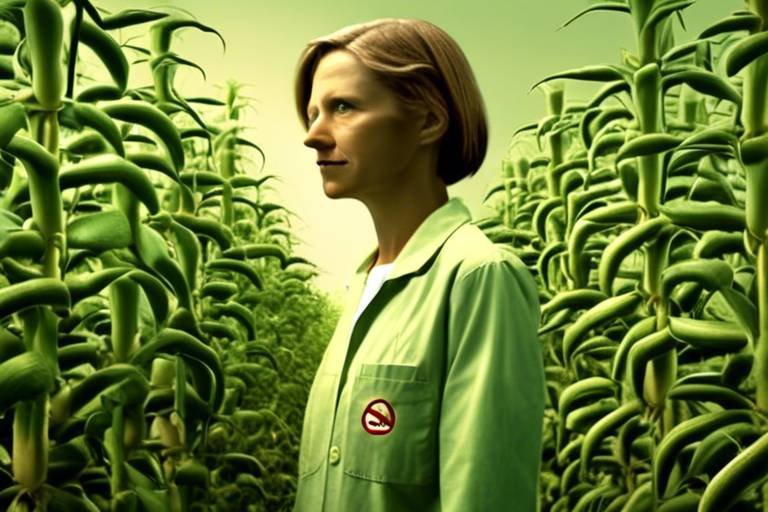Philosophy and the Politics of Genetically Modified Organisms (GMOs)
In today’s world, the topic of Genetically Modified Organisms (GMOs) is not just a scientific issue but a profound philosophical and political dilemma that stirs passionate debates. As we dive into the complexities of GMOs, we uncover layers of ethical questions, regulatory challenges, and societal impacts that shape our understanding and acceptance of this technology. Are we playing God by altering the genetic makeup of living organisms? Or are we simply enhancing nature to feed a growing population? These questions are not just academic; they resonate deeply in our daily lives, influencing everything from our food choices to our environmental policies.
The philosophical discourse surrounding GMOs often begins with the ethical implications of genetic modification. On one hand, proponents argue that GMOs can lead to increased agricultural productivity and food security, which are crucial in combating hunger in a world with a rapidly growing population. On the other hand, critics raise alarms about the potential risks to human health and the environment, suggesting that we may not fully understand the long-term consequences of tampering with nature. This tug-of-war between innovation and caution creates a rich tapestry of philosophical inquiry, prompting us to consider our responsibilities as stewards of the earth.
Moreover, the political landscape surrounding GMOs is equally intricate. Different countries have adopted varying regulatory frameworks that reflect their cultural values, economic interests, and public perceptions. For instance, while the United States has embraced GMOs with relatively lenient regulations, many European countries have imposed strict restrictions or outright bans. This divergence raises important questions about the role of government in managing biotechnological advancements. Should governments prioritize public health and environmental safety over economic growth, or is it possible to achieve both?
As we navigate the political and philosophical waters of GMOs, it’s essential to recognize the impact of public perception. Misinformation can spread rapidly, fueled by sensational media representation and cultural beliefs. This often leads to a polarized public opinion, where some view GMOs as a miracle solution, while others see them as a threat to nature and health. Understanding these perceptions is crucial for fostering informed discussions and policies that balance innovation with caution.
In summary, the intersection of philosophy and politics in the realm of GMOs presents a fascinating yet challenging landscape. It compels us to reflect on our values, our responsibilities, and the future we envision for our planet. As we continue to explore this topic, we must engage in open dialogues that consider the ethical, environmental, and economic dimensions of GMOs, ensuring that all voices are heard in this critical conversation.
- What are GMOs? GMOs are organisms whose genetic material has been altered using genetic engineering techniques to introduce desirable traits.
- Are GMOs safe to eat? The majority of scientific studies suggest that GMOs are safe for human consumption, but debates continue regarding their long-term effects.
- How do GMOs affect the environment? GMOs can have both positive and negative environmental impacts, including potential biodiversity loss and reduced pesticide use.
- Why are GMOs controversial? The controversy stems from ethical concerns, health risks, environmental impacts, and the influence of large agribusiness corporations.
- What regulations exist for GMOs? Regulations vary by country, with some implementing strict guidelines and others allowing for more lenient oversight.

The Ethical Landscape of GMOs
The debate surrounding genetically modified organisms (GMOs) is not just a scientific or agricultural issue; it is deeply rooted in ethical considerations that challenge our values and beliefs. At the heart of this discussion lies a fundamental question: Is it right to alter the genetic makeup of living organisms? This question invites a multitude of perspectives, each shaped by different ethical frameworks. For instance, some argue from a utilitarian perspective, suggesting that if GMOs can lead to increased food production and reduced hunger, then their use is justified. However, this raises further questions about the long-term consequences of such modifications on human health and the environment.
Additionally, the responsibilities of scientists and corporations come into play. Are they obligated to consider the broader implications of their work? The potential consequences of genetic modification extend beyond immediate benefits; they include the risk of unforeseen ecological impacts and the ethical duty to protect biodiversity. For example, the introduction of genetically modified crops may lead to biodiversity loss as these crops outcompete native species. This scenario not only threatens the delicate balance of ecosystems but also raises questions about our role as stewards of the planet.
Moreover, the ethical landscape is complicated by the notion of informed consent. Consumers often feel they lack adequate information about what GMOs are and how they affect their health and the environment. This lack of transparency can lead to mistrust and anxiety, fueling the divide between proponents and opponents of GMOs. As such, it becomes crucial for scientists and policymakers to engage with the public, providing clear and accessible information about the benefits and risks associated with GMO technology.
In this context, it is also essential to consider the intergenerational ethics of GMOs. What legacy are we leaving for future generations? Will they inherit a world where food security is guaranteed through genetic modification, or will they face the repercussions of our current decisions? These questions compel us to think critically about the long-term impacts of our choices today.
To summarize, the ethical landscape of GMOs is multifaceted and requires us to navigate complex moral waters. It is not merely a matter of scientific advancement; it is about our responsibilities to each other, to the environment, and to future generations. As we continue to explore this terrain, dialogue and education will be key in shaping a responsible approach to biotechnology.
- What are GMOs? Genetically modified organisms (GMOs) are living organisms whose genetic material has been artificially manipulated in a laboratory through genetic engineering.
- Are GMOs safe to eat? The majority of scientific studies indicate that GMOs are safe to eat, but ongoing research and monitoring are essential to ensure their safety.
- What are the environmental impacts of GMOs? GMOs can lead to reduced biodiversity, pesticide resistance, and potential ecological imbalances, necessitating careful management.
- How are GMOs regulated? Regulatory frameworks vary by country, with some nations having stringent assessments while others adopt a more lenient approach.

Regulatory Frameworks and Policies
The regulation of Genetically Modified Organisms (GMOs) is a complex and multifaceted issue that varies significantly across different countries and regions. This patchwork of regulations is shaped by a combination of scientific assessments, public opinion, and political agendas. In essence, the frameworks governing GMOs are not just about safety; they also reflect deeper societal values and priorities. For instance, in the United States, the regulatory approach tends to be more permissive, focusing on the safety of the products rather than the process of genetic modification itself. This is evident in the way the U.S. Department of Agriculture (USDA), the Environmental Protection Agency (EPA), and the Food and Drug Administration (FDA) each play distinct roles in overseeing GMO safety, often leading to a streamlined approval process that can expedite the introduction of genetically modified crops into the market.
In contrast, many European countries adopt a more cautious stance. The European Union (EU) has established stringent regulations that require extensive safety assessments and labeling of GMO products. This regulatory framework is rooted in the precautionary principle, which prioritizes consumer safety and environmental protection over rapid technological advancement. As a result, the EU's approach includes rigorous testing for potential allergens and environmental impacts, ensuring that GMOs meet high safety standards before they can be cultivated or sold.
To illustrate the differences in regulatory frameworks, consider the following table that summarizes key aspects of GMO regulations in the U.S. and the EU:
| Aspect | United States | European Union |
|---|---|---|
| Regulatory Agencies | USDA, EPA, FDA | EFSA (European Food Safety Authority) |
| Approval Process | Product-based, less stringent | Process-based, more stringent |
| Labeling Requirements | Voluntary; state-level initiatives | Mandatory for all GMO products |
| Public Involvement | Limited; mainly scientific community | Extensive public consultations |
These differences highlight a fundamental divergence in how societies perceive the risks and benefits associated with GMOs. In the U.S., the emphasis is often placed on innovation and market freedom, while in Europe, there is a stronger focus on precaution and consumer rights. This divergence can lead to significant implications for international trade, as products deemed safe in one region may face restrictions in another.
Moreover, the regulatory landscape is continually evolving. As new technologies emerge, such as gene editing techniques like CRISPR, regulators are faced with the challenge of adapting existing frameworks to address these advancements. This dynamic nature of regulation underscores the importance of ongoing dialogue among scientists, policymakers, and the public to ensure that safety, ethics, and innovation can coexist harmoniously.
In conclusion, understanding the regulatory frameworks surrounding GMOs is crucial for grasping the broader implications of biotechnology in our food systems. As these frameworks continue to evolve, they will play a pivotal role in shaping the future of GMOs, influencing everything from agricultural practices to consumer choices.
- What are GMOs? Genetically Modified Organisms (GMOs) are organisms whose genetic material has been altered using genetic engineering techniques.
- Why are GMOs regulated? GMOs are regulated to ensure their safety for human consumption and environmental impact.
- How do regulatory frameworks differ worldwide? Regulatory frameworks vary significantly, with some countries adopting stringent measures while others are more permissive.
- What is the role of public opinion in GMO regulation? Public opinion can greatly influence regulatory policies, often leading to stricter measures in response to consumer concerns.

Public Perception and Misinformation
When it comes to genetically modified organisms (GMOs), public perception plays a pivotal role in shaping the discourse around their use and regulation. It’s fascinating how a topic that involves complex science can be influenced by emotions, beliefs, and even cultural narratives. Many people have strong feelings about GMOs, often fueled by a mix of fear, misunderstanding, and misinformation. But why does this happen? Well, let’s dive deeper!
One of the major factors contributing to public skepticism about GMOs is the spread of misinformation. With the rise of social media, it’s easier than ever for false claims and sensationalist stories to circulate. For instance, you might have come across posts claiming that GMOs are responsible for various health issues or environmental disasters. These claims can create a visceral reaction, making people wary of anything that sounds too scientific or complex. But how can we discern fact from fiction?
To tackle this issue, it's essential to understand the sources of information that shape public opinions. Here are a few key players:
- Media Representation: News outlets often prioritize sensational stories over balanced reporting, leading to distorted perceptions.
- Activist Groups: Many organizations advocate against GMOs, sometimes using fear-based tactics that can skew public understanding.
- Personal Experiences: Anecdotal evidence can be powerful. If someone has a negative experience with a GMO product, they may share it widely, influencing others.
Moreover, cultural beliefs and values significantly impact how GMOs are perceived. In some cultures, there’s a strong emphasis on naturalness in food production. This can lead to a belief that anything altered through technology is inherently harmful. For example, in Europe, the regulatory environment surrounding GMOs is much stricter compared to the United States. This difference reflects a broader cultural attitude towards technology and food safety.
Interestingly, studies have shown that when people are presented with scientific evidence about the safety and benefits of GMOs, their attitudes can shift. However, the challenge lies in overcoming the initial emotional reactions that misinformation can provoke. This is where effective communication comes into play. Scientists and policymakers must work together to provide clear, accessible information that addresses public concerns without sounding condescending.
In conclusion, the public perception of GMOs is a complex interplay of facts, fears, and cultural narratives. As we navigate this landscape, it’s crucial to foster open dialogues and encourage critical thinking. Only then can we hope to bridge the gap between scientific understanding and public sentiment, paving the way for informed decisions about the future of biotechnology.
- What are GMOs? Genetically modified organisms are living entities whose genetic material has been altered using genetic engineering techniques.
- Are GMOs safe to eat? Numerous scientific studies have found GMOs to be safe for human consumption and beneficial for agricultural practices.
- Why are people concerned about GMOs? Concerns largely stem from misinformation, fear of the unknown, and cultural beliefs about natural foods.
- How can I learn more about GMOs? Reliable sources include scientific journals, government health agencies, and educational institutions that offer balanced information.

Environmental Impacts of GMOs
The environmental impacts of genetically modified organisms (GMOs) are a subject of intense debate and concern. On one hand, proponents argue that GMOs can lead to increased agricultural efficiency and reduced pesticide use, while critics highlight potential risks to biodiversity and ecosystem health. Understanding these impacts requires a deep dive into the ecological consequences of GMO cultivation.
One of the primary environmental concerns is biodiversity loss. When farmers adopt genetically modified crops, especially monocultures, they often plant a single type of crop over extensive areas. This practice can lead to a reduction in the variety of plants and animals in those ecosystems, as native species may struggle to compete. For instance, if a GMO crop is engineered to resist pests, the natural predators of those pests may decline due to a lack of food sources, leading to an imbalance in the local ecosystem.
Moreover, the use of GMOs can contribute to the development of pesticide resistance. As certain crops are modified to withstand specific herbicides, farmers may rely more heavily on these chemicals, inadvertently encouraging the evolution of resistant weed species. This can create a vicious cycle where farmers are forced to use even more potent herbicides, which can have detrimental effects on surrounding flora and fauna. The consequences can ripple through the food chain, affecting everything from soil microorganisms to larger wildlife.
Another critical aspect to consider is the long-term sustainability of genetically modified crops. While they may offer short-term benefits, such as higher yields and reduced labor costs, the ecological footprint of these practices must be assessed. For example, if GMO crops lead to soil degradation or water depletion, the long-term viability of farming in those areas could be jeopardized. It’s essential to evaluate whether the immediate gains from GMO adoption are worth the potential costs to the environment.
| Environmental Impact | Description |
|---|---|
| Biodiversity Loss | Reduction in plant and animal species due to monoculture practices. |
| Pesticide Resistance | Development of resistant weed species leading to increased herbicide use. |
| Soil Degradation | Potential negative effects on soil health due to chemical inputs. |
| Water Use | Increased demand for water resources in GMO cultivation. |
In addition to these concerns, the introduction of GMOs into ecosystems raises questions about gene flow. This phenomenon occurs when genes from genetically modified plants transfer to wild relatives or non-GMO crops, potentially leading to unintended consequences. For instance, if a GMO crop designed to resist a particular pest crosses with a wild species, it could create a new hybrid that disrupts local ecosystems. This unpredictability is a significant factor in the ongoing debate about the safety and regulation of GMOs.
Ultimately, the environmental impacts of GMOs are complex and multifaceted. While they hold the promise of increased food production and reduced chemical use, the potential risks to biodiversity, ecosystem health, and long-term sustainability cannot be overlooked. As we continue to explore the capabilities of biotechnology, a balanced approach that considers both the benefits and risks is essential for responsible stewardship of our planet.
- What are GMOs? Genetically modified organisms are organisms whose genetic material has been altered using genetic engineering techniques.
- How do GMOs affect biodiversity? GMOs can lead to biodiversity loss by promoting monoculture farming practices, which reduce the variety of species in an ecosystem.
- What is pesticide resistance? Pesticide resistance occurs when pests evolve to survive treatments that previously killed them, often due to the overuse of specific pesticides associated with GMO crops.
- Can GMOs impact soil health? Yes, the intensive use of certain chemicals in GMO farming can lead to soil degradation and reduced soil health over time.

Economic Considerations in GMO Adoption
The adoption of genetically modified organisms (GMOs) has sparked a plethora of economic discussions and debates. At the heart of this conversation lies the question: How do GMOs influence the agricultural economy? Understanding the economic implications of GMOs is crucial for farmers, consumers, and policymakers alike. The introduction of GMOs into agriculture has the potential to transform market dynamics, create new opportunities, and pose challenges that require careful navigation.
One of the most significant economic benefits of GMOs is their ability to increase crop yields. With the world population expected to reach nearly 10 billion by 2050, the demand for food is skyrocketing. GMOs can be engineered to withstand harsh environmental conditions, pests, and diseases, leading to higher productivity. For instance, crops like Bt corn and Roundup Ready soybeans have demonstrated substantial yield increases compared to their non-GMO counterparts. This increase in productivity can lead to lower food prices, benefiting consumers and enhancing food security.
However, the economic landscape is not without its complexities. The role of agribusiness in GMO adoption cannot be overlooked. Large biotech companies often dominate the market, creating a scenario where small farmers may struggle to compete. These companies hold patents on genetically modified seeds, which can lead to increased costs for farmers who must purchase new seeds each planting season. This reliance on patented seeds can create a cycle of dependency, where farmers find themselves caught between the need for high-yield crops and the financial burdens imposed by biotech firms.
Moreover, the economic implications extend beyond individual farmers. The global market for GMOs is vast and interconnected. Countries that embrace GMO technology may find themselves at a competitive advantage in international trade, while those that resist may face economic isolation. For example, nations in Europe have been more cautious in their approach to GMOs, leading to a disparity in agricultural productivity compared to countries like the United States, where GMOs are widely accepted. This divergence can impact trade agreements, pricing structures, and overall market access.
In addition to these macroeconomic factors, it’s essential to consider the livelihoods of farmers. While GMOs can lead to increased yields, they also come with risks. The potential for crop failure due to unforeseen circumstances—such as pest resistance or environmental changes—can jeopardize farmers' incomes. Furthermore, the public perception of GMOs can influence market demand. If consumers are hesitant to purchase GMO products, farmers may face challenges in selling their harvests, leading to financial instability.
To illustrate the economic landscape of GMO adoption, consider the following table that summarizes key economic factors:
| Economic Factor | Positive Impact | Negative Impact |
|---|---|---|
| Crop Yields | Increased productivity and food security | Potential over-reliance on specific crops |
| Market Dynamics | Lower food prices for consumers | Market control by large agribusiness |
| Farmer Livelihoods | Higher income potential | Risk of crop failure and dependency on biotech companies |
| Global Trade | Competitive advantages for adopting countries | Economic isolation for non-adopting countries |
In conclusion, the economic considerations surrounding GMO adoption are multifaceted and often contradictory. While there are undeniable benefits, such as increased yields and potential lower food prices, the challenges posed by agribusiness dominance, market dynamics, and public perception cannot be ignored. As we move forward, it’s vital for stakeholders—from farmers to consumers—to engage in open dialogues about the implications of GMOs on our economy and society as a whole.
- What are GMOs? GMOs, or genetically modified organisms, are organisms whose genetic material has been altered using genetic engineering techniques to introduce desirable traits.
- How do GMOs affect food prices? GMOs can lead to increased crop yields, which may lower food prices. However, market dynamics and the influence of agribusiness can complicate this effect.
- Are GMOs safe for human consumption? The majority of scientific studies indicate that GMOs are safe to eat. However, public perception and individual beliefs may vary.
- What is the role of agribusiness in GMO adoption? Agribusiness companies often control the market for GMO seeds, influencing prices and availability for farmers.

Global Perspectives on GMOs
The debate surrounding genetically modified organisms (GMOs) is not confined to a single region or culture; it is a global phenomenon. Different countries have adopted varied approaches to GMOs, shaped by their unique socio-economic conditions, cultural beliefs, and political landscapes. For instance, while some nations embrace GMOs as a solution to food security and agricultural efficiency, others remain skeptical, fearing potential health risks and environmental consequences. This divergence in perspectives highlights the complex interplay between science, ethics, and policy on a global scale.
In the United States, GMOs are widely accepted and integrated into mainstream agriculture. The U.S. government has established a regulatory framework that promotes the development and commercialization of genetically modified crops. This framework is primarily based on the principle of substantial equivalence, which assumes that GMOs are as safe as their conventional counterparts. As a result, American farmers have adopted GMOs extensively, often citing benefits such as increased yields, reduced pesticide use, and enhanced resistance to pests and diseases.
Conversely, in the European Union, a more precautionary approach prevails. The EU has stringent regulations governing the approval and labeling of GMOs, reflecting a cautious attitude toward biotechnology. Public sentiment in many European countries leans toward skepticism, fueled by concerns about food safety, environmental impact, and ethical considerations. This skepticism is often amplified by media representation and grassroots movements advocating for organic and non-GMO foods. As a result, the EU has seen a slower adoption rate of GMOs compared to the U.S., with consumers often demanding transparency and labeling of genetically modified products.
In developing countries, the perspectives on GMOs are equally diverse. Some nations, particularly in Africa, view GMOs as a potential solution to food insecurity and agricultural challenges posed by climate change. For example, countries like South Africa and Burkina Faso have embraced genetically modified crops, such as Bt cotton and drought-resistant maize, to enhance food production and improve farmers' livelihoods. However, other countries remain hesitant, grappling with issues of dependency on multinational seed companies and the socio-economic implications of adopting such technologies.
To illustrate the global landscape of GMO acceptance, we can look at a comparative table of GMO regulations in several key regions:
| Region | GMO Acceptance | Regulatory Approach | Key Crops |
|---|---|---|---|
| United States | High | Substantial equivalence | Corn, Soybeans, Cotton |
| European Union | Low | Precautionary principle | Limited approval |
| Africa | Varies by country | Mixed; some embrace, others resist | Bt Cotton, Drought-resistant Maize |
| Asia | Growing acceptance | Varied; some countries have strict regulations | Golden Rice, Bt Brinjal |
As nations navigate the complexities of biotechnology, the dialogue surrounding GMOs continues to evolve. The role of global trade and international agreements cannot be overlooked, as they influence national policies and shape public perceptions. Organizations like the World Trade Organization (WTO) and the Food and Agriculture Organization (FAO) play critical roles in facilitating discussions on GMOs, promoting safe and sustainable agricultural practices worldwide.
Ultimately, the global perspectives on GMOs reflect a mosaic of beliefs, values, and priorities. As we move forward, it is crucial to foster an open dialogue that considers the diverse viewpoints and experiences of different countries. This ongoing conversation will be essential in addressing the challenges and opportunities presented by GMOs, ensuring that biotechnology serves the common good while respecting cultural differences and ethical considerations.
- What are GMOs? GMOs, or genetically modified organisms, are organisms whose genetic material has been altered using genetic engineering techniques to exhibit desired traits.
- Are GMOs safe to eat? The consensus among many scientific organizations is that GMOs currently on the market are safe to eat. However, public opinion varies widely.
- Why do some countries ban GMOs? Concerns about health risks, environmental impacts, and ethical considerations contribute to the bans or restrictions on GMOs in some countries.
- How do GMOs affect the environment? GMOs can have both positive and negative environmental impacts, including effects on biodiversity and pesticide use, which are subjects of ongoing research.

Philosophical Theories and GMOs
When diving into the intricate world of Genetically Modified Organisms (GMOs), one can't help but encounter a myriad of philosophical theories that shed light on the ethical dimensions of biotechnology. These theories serve as lenses through which we can analyze the moral implications of manipulating life at its most fundamental level. So, what do these philosophical frameworks tell us about GMOs?
First off, let's talk about utilitarianism. This theory, rooted in the idea of maximizing happiness and minimizing suffering, raises the question: do the benefits of GMOs outweigh the potential risks? Proponents argue that GMOs can lead to increased food production, reduced pesticide use, and enhanced nutritional content, which could ultimately alleviate hunger and improve public health. However, critics caution that the long-term consequences on ecosystems and human health are still uncertain, suggesting that we must tread carefully. The utilitarian perspective pushes us to weigh the scales—are we truly enhancing overall well-being, or are we risking unforeseen consequences?
On the flip side, we have deontological ethics, which emphasizes the importance of duty and principles over consequences. From this viewpoint, one might argue that manipulating genetic material is inherently wrong, regardless of the outcomes. This perspective raises vital questions about the moral responsibilities of scientists and corporations involved in GMO research and production. Are they duty-bound to prioritize the health of the environment and society over profit? The deontological approach compels us to consider whether there are certain lines that should never be crossed in the pursuit of innovation.
Then, we have virtue ethics, which focuses on the character of the individuals making decisions rather than the rules they follow or the outcomes they produce. This perspective invites us to ponder: what kind of society do we want to cultivate? Are we nurturing a culture of responsibility, respect for nature, and ethical integrity in our pursuit of scientific advancement? Virtue ethics encourages a holistic view, prompting us to consider how our actions reflect our values and the kind of legacy we wish to leave for future generations.
Furthermore, the interplay between these philosophical theories can be quite fascinating. For instance, a utilitarian might find themselves aligning with deontological principles when it comes to protecting endangered species from GMO-related harm. Similarly, virtue ethics could lead us to adopt a more cautious approach to GMOs, emphasizing the importance of community dialogue and ethical reflection in decision-making processes. The complexity of these philosophical frameworks highlights that the conversation surrounding GMOs is not just about science and technology; it’s deeply rooted in our values and beliefs.
To better understand the implications of these theories, consider the following table that summarizes the key aspects of each philosophical approach:
| Philosophical Theory | Focus | Key Questions |
|---|---|---|
| Utilitarianism | Consequences and overall happiness | Do the benefits of GMOs outweigh the risks? |
| Deontological Ethics | Moral duties and principles | Is manipulating genetic material inherently wrong? |
| Virtue Ethics | Character and values of decision-makers | What kind of society do we want to cultivate? |
In conclusion, the philosophical discourse surrounding GMOs is not merely an academic exercise; it is a vital part of the ongoing conversation about the future of our food systems. As we grapple with the ethical implications of biotechnology, these theories provide a framework for understanding the complex moral landscape we navigate. By engaging with these philosophical perspectives, we can foster a more informed and nuanced dialogue about the role of GMOs in our society.
- What are GMOs? Genetically Modified Organisms (GMOs) are organisms whose genetic material has been altered using genetic engineering techniques.
- Why are GMOs controversial? The controversy stems from ethical concerns, potential health risks, environmental impacts, and socioeconomic implications.
- How do different philosophical theories view GMOs? Utilitarianism focuses on outcomes, deontological ethics emphasizes moral duties, and virtue ethics considers the character of decision-makers.
- What role do regulations play in GMO development? Regulatory frameworks vary by country and are essential for ensuring the safety and efficacy of GMOs.

The Future of GMOs in Society
The future of genetically modified organisms (GMOs) in society is a topic that stirs up a mix of excitement and apprehension. As we stand at the crossroads of biotechnology and food production, the potential advancements in GMO technology could revolutionize how we approach agriculture, sustainability, and even health. Imagine a world where crops are not only resistant to pests but also fortified with essential nutrients, addressing malnutrition in developing regions. Sounds like science fiction, right? But this is a very real possibility that could reshape our food systems.
However, with great power comes great responsibility. The ethical implications of such advancements cannot be overlooked. As scientists and policymakers navigate this uncharted territory, the conversation around GMOs must include diverse voices from various sectors of society. It's not just about what we can do; it's about what we should do. This brings us to the importance of public dialogue and engagement. Are we ready to embrace these changes, or will fear and misinformation hold us back? The answer lies in informed discussions that demystify GMOs and their potential benefits.
As technology progresses, we may see an increase in the acceptance of GMOs, particularly as the impacts of climate change become more pronounced. For instance, drought-resistant crops could become vital in regions facing severe water scarcity. The challenge will be to balance innovation with safety, ensuring that regulatory frameworks evolve alongside technological advancements. This is where transparency plays a crucial role. Consumers want to know what they are putting on their plates, and it is essential for biotech companies to foster trust through clear communication and labeling practices.
Moreover, the role of education cannot be understated. By educating the public about the science behind GMOs, we can combat myths and misconceptions that often cloud judgment. Schools, universities, and community programs should integrate discussions about biotechnology into their curricula. Imagine a future generation that understands the science of GMOs, equipped to make informed choices about their food and its impact on the planet.
In addition to education, collaboration between governments, NGOs, and the private sector is vital. This multifaceted approach can help address concerns around food security, environmental sustainability, and economic viability. For example, consider the following table showcasing potential benefits and challenges associated with the future of GMOs:
| Potential Benefits | Challenges |
|---|---|
| Increased crop yields | Public skepticism and resistance |
| Enhanced nutritional content | Environmental impact assessments |
| Reduced reliance on pesticides | Intellectual property issues |
| Climate-resilient crops | Regulatory hurdles |
As we look toward the horizon, it's essential to remain optimistic yet cautious. The ongoing dialogue surrounding GMOs will shape their future in society. By fostering a culture of innovation that prioritizes ethical considerations and public engagement, we can harness the power of biotechnology to create a sustainable and equitable food system. The question remains: Are we ready to embrace this future, or will we let fear dictate our choices? Only time will tell, but one thing is for sure: the conversation is just beginning.
- What are GMOs? Genetically modified organisms (GMOs) are organisms whose genetic material has been altered using genetic engineering techniques.
- Are GMOs safe to eat? Numerous scientific studies have concluded that GMOs are safe to eat and do not pose health risks to humans.
- How do GMOs impact the environment? GMOs can have both positive and negative impacts on the environment, including increased agricultural efficiency and potential biodiversity loss.
- Why are some people against GMOs? Many concerns stem from ethical considerations, environmental impacts, and the desire for transparency in food production.
Frequently Asked Questions
- What are GMOs?
Genetically Modified Organisms (GMOs) are living organisms whose genetic material has been artificially manipulated in a laboratory through genetic engineering. This technology allows scientists to introduce new traits or enhance existing ones, such as pest resistance or improved nutritional content.
- What are the ethical concerns surrounding GMOs?
The ethical landscape of GMOs is complex, raising questions about the moral responsibilities of scientists and the potential consequences of genetic modifications. Concerns include the impact on ecosystems, food safety, and the rights of consumers to know what is in their food.
- How are GMOs regulated?
Regulatory frameworks for GMOs vary significantly around the world. In some countries, rigorous safety assessments are required before GMOs can be approved for use, while others may have more lenient regulations. Governments play a crucial role in managing these biotechnological advancements to ensure public safety and environmental protection.
- Why is public perception of GMOs so divided?
Public perception of GMOs is often influenced by misinformation, media representation, and cultural beliefs. Many people are concerned about the safety and environmental impact of GMOs, while others see them as a solution to food security and agricultural efficiency.
- What are the environmental impacts of GMOs?
The cultivation of GMOs can lead to various environmental consequences, such as biodiversity loss and the development of pesticide-resistant pests. It's essential to consider the long-term sustainability of genetically modified crops within agricultural systems and their potential effects on ecosystems.
- How do GMOs affect farmers economically?
GMOs can have significant economic implications for farmers, influencing market dynamics and food prices. While some farmers benefit from increased yields and reduced pesticide use, others may face challenges related to dependency on agribusiness and the costs of GMO seeds.
- How do different countries view GMOs?
Countries around the globe have varying perspectives on GMOs, influenced by cultural, economic, and political factors. Some nations embrace GMOs for their potential to enhance food production, while others impose strict regulations or outright bans due to safety and ethical concerns.
- What philosophical theories apply to the GMO debate?
Several philosophical theories can be applied to the GMO debate, including utilitarianism, which focuses on the greatest good for the greatest number, and deontology, which emphasizes moral rules and duties. Virtue ethics also plays a role, highlighting the importance of character and moral integrity in biotechnology discussions.
- What does the future hold for GMOs in society?
Looking ahead, the future of GMOs is likely to involve advancements in technology and ongoing discussions about their role in food production. Societal acceptance will be crucial, as will the need for responsible innovation and transparency in biotechnological practices.


















